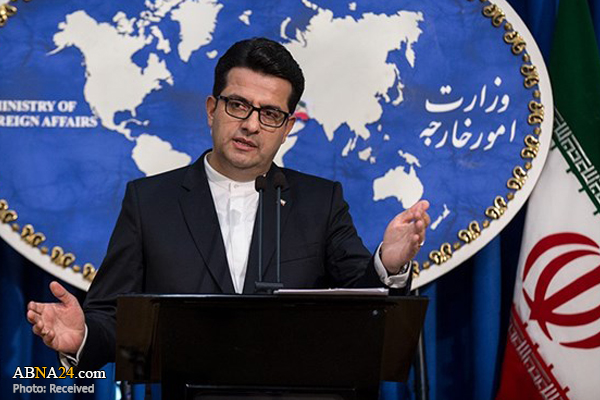AhlulBayt News Agency (ABNA): Iranian Foreign Ministry Spokesman Seyed Abbas Mousavi said on Sunday that an important meeting is slated to be held late on the day where the senior officials of the country would make up their mind about Tehran’s next step in reducing nuclear deal commitments.
Iranian Foreign Ministry spokesman Abbas Mousavi announced on Sunday that President Hassan Rouhani's cabinet will hold an important meeting tonight to decide on the fifth phase of cutting down its nuclear commitments that will determine the country's approach regarding the JCPOA.
The Iranian foreign ministry spokesman said that some decisions had been taken for the fifth step, but due to the current situation, an important meeting will be held on the fifth step which can impact the previous decisions.
"Today's decision will determine Iran's policy concerning the implementation of the JCPOA and the future of the deal," Mousavi said.
The Iranian diplomat made the remarks in his weekly press conference on the occasion of commemorating the martyrdom of IRGC Qods Force Commander Lieutenant General Qassem Soleimani.
He described General Soleimani as a global hero for combating terrorism, violence as well as extremism.
The late commander could be regarded as the person who has captured the hearts and is a best-loved icon, he added.
He went on to say that the foreign media are seeking to introduce Soleimani in a wrong way whereas the plots will go nowhere.
Mousavi thanked the Iraqi nation and government over the funeral ceremony of the resistance martyrs, expressing condolence on the martyrdom of Abu Mahdi Al-Mohandes as well as the other military forces.
Iran has so far rowed back on its nuclear commitments four times in compliance with Articles 26 and 36 of the JCPOA, but stressed that its retaliatory measures will be reversible as soon as the European signatories — France, Britain and Germany — find practical ways to shield mutual trade from the US sanctions.
Head of the Atomic Energy Agency of Iran (AEOI) Ali Akbar Salehi warned the European signatories to the landmark 2015 nuclear deal, officially known as the Joint Comprehensive Plan of Action (JCPOA), that security repercussions of activating the “trigger mechanism” will serve nobody’s interests.
In a press conference on the sidelines of a ceremony last Monday, held to launch the second circuit of Iran’s Arak heavy water reactor, which is located near the central Iranian city of Khondab, Salehi said that if the European signatories to the JCPOA, activate the “trigger mechanism” to mount pressure on Iran, it will mean the demise of the deal.
Under the nuclear deal, signed between Iran and the P5+1 countries (the United States, Britain, France, China, Russia and Germany), Tehran agreed to remove the core of the Arak reactor and fill it with concrete provided that the other parties to the accord redesign it for the production of medical isotopes, which they did not.
The reactor consists of two circuits, with the first one tasked with removing heat from the heart of the reactor, and the secondary circuit responsible for transferring heat from the first circuit to cooling towers and finally to the outside environment.
“Europe wants the JCPOA to survive. The JCPOA is of security importance to them, but whether this demand is commensurate with their ability (to resist US pressures) is a different issue. The ability of Europe depends on its resistance against the United States, but unfortunately they have proven that the 28 (member) states (of the European Union) are less resistant and independent than a single (US) state like California,” Iran's nuclear chief said.
Salehi added that if European countries seek to activate the trigger mechanism, it would be against their will, adding, “If the trigger mechanism is activated, nothing will be left of the JCPOA. This is a contradiction in the Europeans’ discourse.”
Expressing the hope that Europe would amend this discourse, Salehi said, “We hope that this European discourse is rectified, because this discourse will put Europe on the same level with an untrustworthy America.”
“Europe’s prestige has been tarnished before the world’s public opinion and they must not do more damage to this prestige. All parties must try to help the JCPOA survive,” Iran's nuclear chief said.
Elsewhere in his interview, Salehi said that a possible reporting of Iran's nuclear case to the United Nations Security Council would not serve the interests of anyone, warning that in that case, regional and international relations would change, leading to unpredictable repercussions.
He added that if the three European parties to the JCPOA fail to fulfill their obligations under the deal, Iran will make a proportionate decision, but "we hope that the opposite side will make a decision and carry out a measure that will prevent further complication of the issue."
The Iranian nuclear chief noted that it is still too early to talk about Tehran's fifth step in scaling back its commitments under the JCPOA if the European signatories did not take practical measures to salvage it.
Iranian President Hassan Rouhani is in charge of announcing the country's steps to reduce its JCPOA commitments, but he has made no serious remarks in this regard yet, he said, adding that the president would make the necessary decisions and order the AEOI to implement them in due time.
He said Iran may accelerate certain measures or increase production.
..................................
End/ 257
source : FNA
Sunday
5 January 2020
4:42:24 PM
999579
Foreign Ministry: Iran to decide on nuclear deal tonight

Iranian Foreign Ministry Spokesman Seyed Abbas Mousavi said on Sunday that an important meeting is slated to be held late on the day where the senior officials of the country would make up their mind about Tehran’s next step in reducing nuclear deal commitments.
